希腊罗马神话欣赏 Unit 5
古希腊罗马神话课件

母狼传说
母狼在神话中是罗马的象 征,代表着母爱和保护。
神话与历史交织
罗马的历史和神话传说紧 密相连,许多罗马的历史 事件和人物都有神话的背 景。
罗马众神与神话故事
朱庇特
罗马神话中的众神之王, 相当于希腊神话中的宙斯 。
朱诺
罗马神话中的天后,相当 于希腊神话中的赫拉。
维纳斯
罗马神话中的爱与美的女 神,相当于希腊神话中的 阿佛洛狄忒。
泰坦神族与奥林匹斯神族
总结词
介绍泰坦神族和奥林匹斯神族之间的 关系和权力斗争
详细描述
泰坦神族是乌拉诺斯的后代,他们统 治着世界。但随着时间的推移,他们 被自己的子女推翻,奥林匹斯神族取 而代之。
人类的诞生与命运
总结词
描述人类的起源和命运
详细描述
根据古希腊神话,人类是由泰坦神族中的普罗米修斯创造的。他使用泥土和水创造了人类,并赋予了人类智慧和 情感。然而,人类也因此成为了其他神祇的玩物。
重要的神话人物与故事
总结词
介绍一些重要的神话人物和他们的事迹
详细描述
普罗米修斯是古希腊神话中的重要人物,他帮助人类获得了火种,从而改善了人类的生活。但他因此 被宙斯惩罚,被锁在高加索山的山崖上,任由一头老鹰来啄食他的肝。
03
古罗马神话故事
罗马的起源与神话传说
01
02
03
罗马起源的神话
根据古罗马神话,罗慕路 斯和雷姆斯是罗马的创始 人,他们是由母狼抚养大 的双胞胎兄弟。
例如,法国画家雅克-路易·大卫的《马 拉之死》、雕塑家米开朗基罗的《创 世纪》等,都以古希腊罗马神话为灵 感,展现了神话中的形象和故事。
现代艺术中的古希腊罗马神话元素
古希腊罗马神话在现代艺术中仍然具有影响力,许多艺术家 将神话元素融入到自己的作品中。
希腊罗马神话赏析

The course consists of a combination of lectures by the instructor, student-led presentations of some short mythical stories and students adaption of three ancient Greek tragedies, namely, Oedipus the King, Oresteia and Medea. For the first 5 days, we’ll mainly focus on stories about major gods and goddesses, during the next 3 days we shall introduce three Greek tragedies. The following 3 days will be stories about Greek heroes. Then we will spend another 3 days briefly discussing Homer’s The Iliad and the Odyssey, and Vigil’s the Aeneas.
英文简介
Greek and Roman mythology has exercised a most far-reaching influence in western civilization, with its fascinating stories long being the themes of numerous artists, playwrights, poets, philosophers, composers, and filmmakers.
希腊罗马神话欣赏

Course Description
Requirements & Grading
REQUIREMENTS Participation GRADING 30% DISTRIBUTION Throughout the term
Centering on the island of Crete Named after the legendary king Minos Bronze Age civilization
克诺索斯王宫遗址 距今3000多年前,克里特岛 北部城市克诺索斯在卫生和 舒适方面达到了相当现代化 的水准。取暖、排水设施精 良。历史上第一个把浴缸引 进日常生活的城市。
Pre-eminent Stage(2)
(500 -336 BC )
Conflict with the kingdom of Persia
Athens reached its greatest political and cultural heights Wars between Athens and Sparta
APPRECIATION OF GREEK & ROMAN MYTHOLOGY
希腊罗马神话欣赏
About the Course
• Course Description • Requirements & Grading • Outline • Recommended Reading
Course Description
without certain knowledge of Greek and Roman mythology, one can never fully understand and appreciate western culture. (eg. literature, arts,… character)
希腊罗马神话期末考试
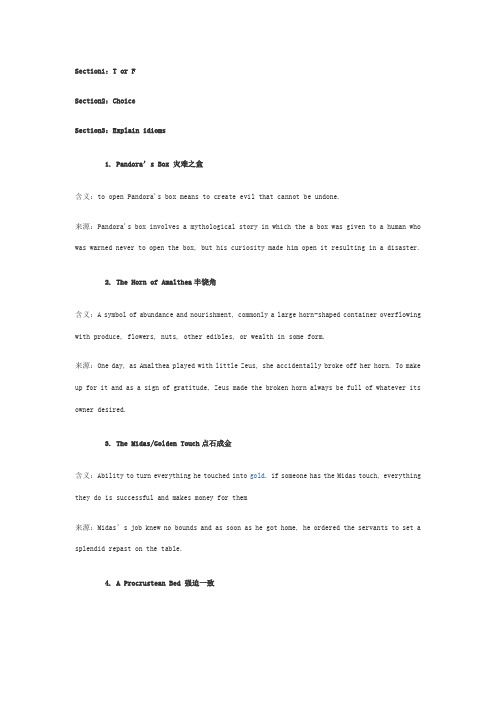
Section1:T or FSection2:ChoiceSection3:Explain idioms1. Pandora’s Box 灾难之盒含义:to open Pandora's box means to create evil that cannot be undone.来源:Pandora's box involves a mythological story in which the a box was given to a human who was warned never to open the box, but his curiosity made him open it resulting in a disaster.2. The Horn of Amalthea丰饶角含义:A symbol of abundance and nourishment, commonly a large horn-shaped container overflowing with produce, flowers, nuts, other edibles, or wealth in some form.来源:One day, as Amalthea played with little Zeus, she accidentally broke off her horn. To make up for it and as a sign of gratitude, Zeus made the broken horn always be full of whatever its owner desired.3. The Midas/Golden Touch点石成金含义:Ability to turn everything he touched into gold. if someone has the Midas touch, everything they do is successful and makes money for them来源:Midas’s job knew no bounds and as soon as he got home, he ordered the servants to set a splendid repast on the table.4. A Procrustean Bed 强迫一致含义:When something is Procrustean, different lengths or sizes or properties are fitted to an arbitrary standard.来源: Procrustes was a rogue smith and bandit from Attica who physically attacked people by stretching them or cutting off their legs, so as to force them to fit the size of an iron bed.5. Sow the Dragon Teeth挑起纠纷含义:The dragon's teeth, once planted, would grow into fully armed warriors.来源:In Greek myth, dragon’s teeth feature prominently in the legends of the Phoenician p rince Cadmus and Jason's quest for the Golden Fleece.6. Apple of Discord祸根含义: A euphemism for a small matter that could lead to a bigger dispute.来源:The Greek goddess of discord, Eris, became disgruntled after she was excluded from the wedding of Peleus and Thetis. In retaliation, she tossed a golden apple inscribed Kallisti(‘for the most beautiful one'), into the wedding party. Three goddesses claimed the apple: Hera, Athena, and Aphrodite. Paris of Troy was appointed to select the recipient. He awarded the apple to Aphrodite, thus indirectly causing the Trojan War.7. The Heel of Achilles唯一的弱点含义:A deadly weakness in spite of overall strength, that can actually or potentially leads to downfall来源:The mythological origin refers to a physical vulnerability, metaphorical references to other attributes or qualities that can lead to downfall are common.Thetis treated Achilles with Ambrosia, making him invulnerable. Thetis burned away his mortality in the house fire except on the heel, with which he was held.Thetis dipped the infant Achilles in the river Styx, holding onto him by his heel.8. Penelope’s Web永远做不完的工作含义:The tactics of delaying sth on purpose; the task that can never be finished来源:Penelope is the wife of Odysseus who was called to fight in the Trojan War. She waits twenty years for the final return of her husband .In order to put off remarriage, She has devised tricks to delay her suitors, one of which is to pretend to be weaving a burial shroud for Odysseus's elderly father Laertes and claiming that she will choose a suitor when she has finished. Every night for three years, she undoes part of the shroud, until Melantho, one of twelve unfaithful serving women, discovers her chicanery and reveals it to the suitors.9. Between Scylla and Charybdis进退维谷含义:Being between Scylla and Charybdis is an idiom expresses the meaning of "having to choose between two evils".来源: Scylla was rationalized as a rock shoal (described as a six-headed sea monster) on the Italian side of the strait and Charybdis was a whirlpool off the coast of Sicily. They were regarded as a sea hazard located close enough to each other that they posed an inescapable threat to passing sailors; avoiding Charybdis meant passing too close to Scylla and vice versa. According to Homer, Odysseus was forced to choose which monster to confront while passing through the strait; he opted to pass by Scylla and lose only a few sailors, rather than risk the loss of his entire ship in the whirlpool.10. Necklace of Harmonia不祥之物含义:Necklace of Harmonia brought great misfortune to all of its wearers or owners.来源:Aphrodite bore a daughter, Harmonia, from Ares' seed. Harmonia married Cadmus, the founder of Thebes. Upon hearing of the royal engagement, Hephaestus presented Harmonia with an exquisite necklace as a wedding gift. The necklace was made by Hephaestus' own hand and was cursed to bring disaster to any who wore it.13. A Sisyphean Task含义:Endlessly laborious or futile来源:Sisyphus was famed as the craftiest of men. He was condemned forever to roll a huge stone up a hill in Hades only to have it roll down again on nearing the top.15. Give a cake to Cerberus含义:bribe来源:Cerberus is a watchdog at the gates of Tartarus. He would let the souls in but not out. However he could be bribed with a honey cake on occasion or with sweet music.Section4:Explain in English the meaning of following terms. 15% (5)1. Anthropomorphism神人同形同性In Greek myth, the gods and goddesses are not only personifications of the forces of the universe, they are seen as being s much like common men and women. The term for this is “Anthropomorphism”, meaning “in the form of a human being.”2. The Five Ages of Men五个时代The Golden Age; the Silver Age; the Bronze Age; the Heroic Age; the Iron Age3. Tartarus 地狱The deeper region, where the Titans had been imprisoned(Tartarus itself formed a dismal picture, it had gates of bronze guarded by Cerberus, surrounded by fire, encased by triple wall, and within, the wailing and cries of those being punished. It is the underworld zone of eternal torment, where the greatest sinners have been punished for their wrong doing.)4. The Elysian Field 天堂领域The paradise for the Greeks5. The Asphodel Field 充满游魂的地方A field inhabited by wandering souls6. Styx 冥河A river in Hades across which Charon ferried the souls of the dead.7.Hubris 过分骄傲Overbearing pride or presumption.8. Satyr森林之神,好色的人Satyrs are a troop of male companions of Pan and Dionysus .In myths they are often associated with pipe-playing9. Maenad 酒神的女祭司,异常激动的女人Often the maenads were portrayed as inspired by him into a state of ecstatic frenzy, through a combination of dancing and drunken intoxication. In this state, they would lose all self-control.10. Narcissism 自恋Narcissus is a man who was renowned for his beauty. He was exceptionally proud, in that he disdained those who loved him. Nemesis saw this and attracted Narcissus to a pool where he saw his own reflection in the water and fell in love with it, not realizing it was merely an image. Unable to leave the beauty of his reflection, Narcissus died.11. Harpy鹰身女妖Half woman, half bird ;vicious winged monster; often depicted as a bird with the head of a woman12. Xenia好客Xenia is the Greek concept of hospitality, or generosity and courtesy shown to those who are far from home.酒神节(in ancient Greece) festivals of the god Dionysus, an orgiastic festival in ancient Greece in honor of Dionysus羊皮盾(宙斯及其女儿雅典娜所持的帝盾)A shield hold by Athena.Under one’s aegis means doing something under the protection of a powerful, knowledgeable, or benevolent source.15. Metamorphosis 变形,变质A person or thing develops and changes into something completely different.( 变形 a complete change of physical form or substance especially as by magic or witchcraft.)半人半神A less important god, especially one who is half god and half human.人首马身的动物,半人马A creature with the head, arms, and chest of a man, and the body and legs of a horse.( In classical mythology, a centaur is a creature with the head, arms, and body of a man, and the body and legs of a horse.)Deucalion FloodAphrodite's magic girdle was a golden girdle that caused men and gods to fall hopelessly in love with her.( Zeus visited Arcadia and Thessaly,and disliked the deadly wrongs of men .He decided to clear the earth of them all.Without hesitation he released the rainy south wind and called upon the heartless Poseidon to help.Soon the whole world sank in a vast ocean, and the entire human race disappeared in the unheard of flood,all but two poor Thessalians .)Section5:Essay questions 15 %( 3)Unit 1: Examples of mythological accounts explaining the explainable.Uranus lay upon Gaia and made love to her without stop. (The interplay between rain and soil that makes plants come to life and grow.)Human Beings fashioned from clayGods and heroes descending into the Underground in the west and emerging in the East. ( Sun rises in the East and sets in the West.)Persephone lived three months in the Underground with her husband and returned to live with her mother Demeter for the rest of year. (The return of spring after winter.)Eros, equipped with his sharp and blunt arrows, brings about many tragedies of human love. (Freud’s theory about love or sex as the most fundamental drive from humans.)Unit 2: Similarities between “the first woman” in th e Greek(Pandora) and Christian creation myth(Eve)Eve was the instigator of tbe whole affair, for through her beauty and her wiles she seduced Adam to taste of the forbidden fruit."Woman is like an apple, lovely without, rotten within."Eve was lured by the snake. Pandora was driven by her curiosity. Their behaviors caused evil and plagues to human-beings.Unit 3: Reasons that ancient Greeks tend to depict Zeus as a promiscuous man, an unfaithful husbandZeus’ fatal Weaknesses: an uncontrollable lust for sexual driveThis shows the anthropomorphism. The ancient emperors usually had many lovers, so the Greeks depict Zeus as a promiscuous man. This also shows the ancient Greeks’ imagination for a man. Reproduction is blessing.Unit 4: Symbolic meaning of Olive Tree in the Greek story and Holy BibleWhen Poseidon and Athena disputed as to which of them should give the name to the capital of Attica, the gods decided, that it should receive its name from him who should bestow upon man the most useful gift. Poseidon then created the horse, and Athena called forth the olive tree, for which the honor was conferred on her. The olive branch in Bible appears in the story of Noah’s ark. When the water receded, a dove flied with an olive branch in its mouse. In the Greek story, OliveTree means peace and wealth. In the Holy Bible , Olive Tree appeared after the flood ,so it represents peace.Unit 5:Differences between Athena and AresAres: thirst for the “hand to hand combat” and the “frenzy of battle and bloodshed”Athena: “war for the purposes of justice”, “peaceful settlements” "war at a distance", “strategic planning of war”What are the distinctive features of Dionysus as a religious festivalThe Dionysia was a large religious festival in ancient Athens in honor of Dionysus.The central event was the performance of tragedies and comedies.Dionysus was a god, mirroring the innate wildness of humanity which Athenians abhorred and tried to control. The Dionysia was a time to let out their inhibitions through highly emotional tragedies or irreverent comedies. People dressed like Satyrs and Maenads. Some men dressed as women and women as men.The Dionysia was also marked by an element of role-reversal and boundary-crossing: lower class citizens could mock the upper class; or women could insult their male relatives.What are the Apollonian and Dionysian elements in music style and human psycheMusic Human psycheApollo Golden lyre, with clear Self-control, moderation,Unit 6Interpretation of the Furies ’, Apollo ’s and Athena ’s judgment on Orestes ’ matricide.( See the scripts in PPT for Unit 6)Orestes is being hounded and terrorized by the Furies for the blood crime of matricide. Orestes killed his mother Clytemnestra, who murdered his father Agamemnon.(背景)Furies: holiness of motherhood, reminiscent of matriarchies; tribal laws = an eye for eye Apollo: laws of males-dominated societyAthena: representing the voice of womanhood to deny mother ’s role as the creator.In the tales of Callisto being transformed into a bear, and Acteon being transformed into a stag, what common theme does the “transformation ” revealAncient Greeks were sober and contemplative. They explore the mystery of human identify and human destiny.1) Transformation from human to non- human which indicates the loss of human identifies.2) Inescapable destiny of “the Hunter being hunted ”Unit 7 (rational) melodies, evoking feelings of harmony and serenitymental balanceDionysus (irrational)Tambourine, with furious and erratic rhythms, expressing passionateand impulsive nature. Spontaneous and instinctiveemotions; self-indulgence,excessHow do you interpret the landscape imagery in the story of Narcissus (See PPT for session 7)Landscape imagery:"There was a clear fountain, with water like silver, to which the shepherds never drove their flocks. Nor did the mountain goats resort to it, nor any of the beasts of the forest; neither was it defaced with fallen leaves or branches; but the grass grew fresh around it, and the rocks sheltered it from the sun.His tears fell into the water and disturbed the image.The "stillness" of clear fountain suggests Narcissus' insusceptibility to the lust of the world. While his tears disturbed the image, his lust of eyes had "deflowered" him, taking away his virginity - a pure soul and a peaceful mind.Interpretation of how Cupid (Eros) falls in love with Psyche. (See the scripts in PPT for unit 7)The erotic love (Eros) and the spiritual love (Psyche) belong together in an inseparable union. The symbolic mean ing of “the union of Cupid (Eros) and Psyche” is "animating spirit".In Venus's garden there are two fountains: one with sweet water, the other one with bitter. Cupid fills two vases with each and then goes to Psyche's bedchamber where she is sleeping. Cupid proceeds to let a few drops from the bitter fountain water fall on her lips, then touches her side with his pointed the touch of the arrow, Psyche wakes up, opens her eyes, and seems to be gazing straight at Cupid who is invisible. This startles Cupid enough that he ends up wounding himself. Cupid immediately sets out to repair the damage he has done to Psyche, and pours a few drops of the sweet water in her hair.Interpretation of ancient Greeks’ attitudes toward immortality in the love story of Tithonus and EosAncient Greeks against immortal youth. They thought that a man shouldn't desire in any way to vary from the kindly race of men, or pass beyond the goal of ordinance.Unit 8&91 Why is Perseus regarded as a perfect heroPerseus was the most perfect Greek hero in myths. He was the only Greek hero who maintained supportive relationship with women throughout his career.In his pursuit of glory, he exhibited both courage and wisdom. In killing Medusa, he outwitted the monster by his shrewdness and tricks rather than mere courage and strength.He was favored by gods when he was alive and after his death, he was transformed into a constellation.2 What is Greeks’ conception of Hero as the story of Heracles/Jason reveals. Hercules is Greece's greatest heroes in myth, is the embodiment of strength, courage and wisdom. Jason :youthful confidence and the spirit of adventurecourage to come alone to capture a kingdomleader of a group of heroesvaliance to fight enormous evils and conquer monsterssuccess in accomplishing the impossible3 What is Greeks’ conception of destiny as the story of Oedipus revealsIt reflects the contradiction between human will and fate, hero of courage, integrity, kindness, courage to take responsibility.Highlight the complex relationship between necessity and contingency, the fate of the "uncertainty" and "frustrated". Describes the fate predominates in Western myth point of view. The riddle of the Sphinx is a symbol of human self-understanding and self-discovery for the first time, began the era of human philosophy.It is also the ancient Greece formation of new moral concepts, expressing the painful memories of humanity from barbarism to civilization.Unit 101 Please interpret the bird imagery in Odysseus’ speech树上坐着一窝小鸟,一窝嗷嗷待哺的麻雀,鸟巢筑在树端的枝桠上,叶片下,雏鸟嗦嗦发抖,一窝八只,连同生养它们的母亲,一共九只。
希腊罗马神话的课件
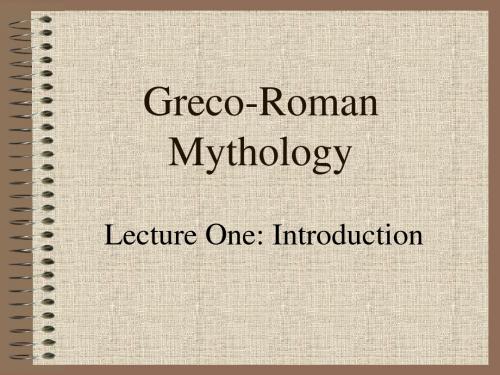
在世界文艺史,特别是欧美近代文艺史上,希腊神话,以及由此脱胎而来 的罗马神话,曾经发挥了重要的作用。希腊艺术,史诗,悲剧,雕刻和 绘画等,无不采用神话为题材,这一事实对近代和现代文坛巨匠的选材 倾向颇有影响。就文学价值而言,希腊神话对于世界文学的影响绝不亚 于《红楼梦》,莎士比亚有很多作品取材于希腊神话,包括《罗密欧与 朱丽叶》、《仲夏夜之梦》、《维纳斯与阿多尼斯》等等。如果读过 《简· 爱》,会发现里面提到过很多希腊神话的名字,特别是有点教养 的绅士、淑女们对希腊神话的典故能运用自如。意大利的但丁,德国的 歌德等这些欧洲文学巨匠,都经常回过头去从神话里汲取素材和典故。 美国的著名诗人著名小说家也是如此。这样,神话故事渗透到世界文学 的机体中去,其魅力有增无减,历久不衰。关于这几点,在一本关于希 腊神话的书上得到了证实,这本书是这样写的: 在西方,对希腊神话了解的多寡,一向是衡量一个人受教育程度的标志。 希腊神话早已成为整个西方文化不可分割的一部分,并不断影响着西方 的社会文化及文学艺术的发展。因此有人讲,不懂得希腊和罗马神话, 就在相当的程度上失去了欣赏和了解欧美文艺的机缘。这种讲法绝不过 分。所以,对于一个学习英语的人来说,了解一点神话故事知识是非常 必要的。
Types of stories: Divine myths: these are stories about gods and goddesses. Many of the stories are about the creation of Earth. The tale of Nu Wa mending the sky is a good example. Fable myths: these stories are about animals that have human characteristics. Many of the stories contain moral teachings. Aesop’s Fable.
希腊罗马神话英文讲义

1 The Beginning of the worldBefore earth and sea and heavens became known the face of nature was one crude, formless mass. Land and sea and air were mingled together. The universe was a uniform darkness, without sun and moon, and the earth was no more than an embryo heap. In the middle of the pervading gloom sat Chaos and his wife, the goddess of Night (Nyx), who reigned but did not rule, for the whole space was lifeless. Centuries later, with the birth of Light and Day, earth and sea and air came into existence. Still later, the union of Gaea (Earth) and Uranus (Heaven) gave birth to the Titans, the Cyclopes and the Centimani, all giants in stature and strength. Afraid that his own gigantic children might usurp his throne, Uranus drove them all back to the earth, and thus roused the resentment of the mother Gaea. At her instigation one of her sons, Kronus (Saturn), attacked and wounded Uranus with a sickle he had taken from his mother, and took over as supreme ruler of the universe. He married his own sister Rhea and entrusted the management of the sun to his brother Hyperion and the moon to his sister Phoebe. He ruled his realm peacefully until an oracle prophesied that he would one day be dethroned by one of his own children. To avert the disaster he took the excessive precaution of swallowing up all his five children one by one immediately after their birth. These were Hestia (Vesta), Demeter (Ceres), Hera (Juno), Poseidon (Neptune) and Hades (Pluto). When Rhea bore the last child, Zeus (Jupiter) by name, Kronus wanted to get rid of him in the same fashion. But the mother wrapped up a piece of stone in the infant’s swathes and handed it over to the unsuspecting father. Thus Zeus was saved, and sent to Mt Ida, where the mountain nymphs did all their power to protect him from any harm. By the time Kronus became aware of the deception it was too late, for young Zeus suddenly appeared before him and easily deposed him. With the help of a nauseous potion, Zeus forced his father to disgorge his five brothers and sisters. But Kronus and his Titans were not reconciled to their defeat. They made war on Zeus and his brothers and sisters. Acting on the advice of his mother Rhea, Zeus released the Cyclopes from under the earth and armed himself of their thunderbolts, for the Cyclopes were thunderbolt-makers. The rebellious Titans were soon reduced to submission and cast down into Tartarus. Zeus became the undisputed ruler on Olympus. He made his sister Hera his queen, and distributed power among his brothers and sisters and his sons and daughters. Among others, Poseidon ruled over the vast expanse of seas and oceans, and Pluto was created lord of the lower world. Thus, for untold centuries, the Olympians reigned supreme in the universe, lording it over man and beast alike, until they were dethroned and superseded by a new, monotheistic faith.2 The Olympian GodsBetween Macedon and Thessaly of northern Greece there stood a lofty mountain range whose cloudy summit rushed into the very heavens. On the culminating point of the range, Mt Olympus, was bathed in bliss and brightness the home of the gods,where Zeus ruled as the father of gods and men. Zeus was not an autocrat by any standards. All the gods submitted to his final word, it was true, but Zeus made them all sit on a committee, a council of twelve members, embracing six gods and six goddesses. First in the Olympian crowd sat Zeus himself, the overlord of gods and men and the wielder of the thunderbolt. Next to him was Hera, his proud and jealous queen. Poseidon, as has been told earlier, was ruler of the sea, and Hades, king of the lower world, had no seat in the council chamber. Apollo was the god of the sun, music, poetry and prophecy, while his twin sister Artemis (Diana) was the goddess of the moon and the chase. Athena (Minerva), the goddess of wisdom and patroness of domestic arts, personified pure intellect; Hestia, the goddess of the hearth, represented home life and family happiness. The blustering Ares (Mars) was the god of war, and the charming Aphrodite (Venus) the goddess of love and beauty. The lame god of fire, Hephaestus (Vulcan), was the forger of the thunder-bolts of Zeus and the fashioner of arms and all sorts of metal work for the gods and heroes. The wing-footed messenger Hermes (Mercury) was the god of invention and commerce and patron of thieves. And the goddess of grains and harvests, Demeter, supervised agriculture and stood for mother of civilization.All the major gods mentioned above assumed human forms of peerless beauty and grace. Often moved by human feelings and desires, they frequently gave way to fits of anger and jealousy and became involved in the ceaseless brawls of the world of man. Among themselves at Olympus they intrigued and scrambled for supremacy; down in the world of mortals they experienced rivalries and frustrations, and enjoyed earthly friendships and loves. A crowed of immortal celestials who looked and behaved in a perfectly human fashion-- that is what the pantheon at Olympus actually was.3 PrometheusPrometheus (forethought) was a Titan. In the war between Zeus and the giants he had stood on the side of the new Olympian gods. Out of clay he fashioned the first man, to whom. Athena gave soul and holy breath. Prometheus bestowed on his creation the gift of fire, which raised man above all animals. Later, at a joint meeting of gods and men held to decide what part of burnt offerings should be allotted to the gods and what to men, Prometheus cut up an ox and divided it into two portions: under the skin he placed the flesh, and under the fat he put the bones, for he new the greedy Zeus loved fat, Zeus saw through the trick and felt displeased at the Titan’s favor towards men. So in a masterful fashion he deprived mankind of the gift of fire. However, Prometheus managed to steal fire from heaven and secretly brought it down to men. Flying into a rage at this wanton act of defiance, Zeus had him chained to a rock on Mount Caucasus, where a ravenous vulture ever tore at his liver which ever grew again. His period of ordeal was to be thirty thousand years. Prometheus faced his bitter fate firmly and never quailed before all the fiery majesty of Zeus. The two were at last reconciled by Heracles (Hercules), who, coming over in quest of the golden apples (see p.164), slew the eagle and set the benefactor of mankind free.4 PandoraAfter the theft of fire Zeus became increasingly hostile to men. One day he commanded his son Hephaestus to mold an image of a beautiful maiden out of clay and asked the gods and goddesses to endow her with different kinds of gifts. Among others, Athena clothed her in a gorgeous robe and Hermes gave her the power of telling lies. A charming young lady, she was the first woman that ever lived. Zeus called her Pandora, for she had received from each of the gods and goddesses a gift which was harmful to men.Zeus decided to send her down to men as a present. So Hermes the messenger brought her to Epimetheus (afterthought), brother of Prometheus. The greatness of her beauty enslaved the hearts of all who looked upon her, and Epimetheus joyfully received her into his house. He had quiet forgotten Prometheus’warning never to accept anything from Zeus. The pair lived a happy life for some time. Then misfortune befell the human world.When he was preoccupied with teaching men the art of living, Prometheus had left a big cask in the care of Epimetheus. He had warned his brother not to open the lid. Pandora was a curious woman, and had been feeling bitterly frustrated that her husband had repeatedly forbidden het to take a look at the contents of the cask. One day, when Epimetheus was out, she lifted the lid and out from it came strife and war, plague and all the sickness, theft and violence, grief and sorrow, and all the other evils that the human world was henceforward to experience. Only hope stayed within the mouth of the jar and never flew out. So men always have hope within their bosoms.5 The Four AgesThere had been four ages since the human world first came into existence, the Golden Age, the Silver Age, the Age of Bronze and the Age of Iron.The Golden Age was the best of all. It was an age when Kronus sat on the throne. Bounteous nature satisfied all the wants of men. There were no extremes of cold and heat. And the evils of the human world were still kept in the cask which Epimetheus guarded and Pandora was not yet made to open. Men lived a blissful life, for ever young, always feasting and revelling, and knowing neither toil nor sorrow. When death came it came like a peaceful sleep, and they became good spirits watching over mortal men.The Silver Age was one in which the human race was somewhat inferior in body and mind. The period of helpless infancy lasted a hundred years, and the time of manhood, short and troubled, men spent in ignorance and evil. They no longer worshipped the gods and offered no sacrifices. However, as the race of the Silver Age was not entirely devoid of virtue, they had some honor and lived on as spirits under the earth. During the Age of Bronze men further degenerated. Clad in bronze and armed with weapons of bronze, they lived in houses of bronze. Ruthless and ferocious, theydelighted in war and perished in ceaseless internecine strife. When they died they descended into the darkness of the lower world.The last age, that of Iron, was one of endless care and grief. There was no family love, no sense of filial duty, and no friendship and hospitality. Nor was there any faith, truth and justice. Evil was rampant, might was right, and the flames of war scorched the earth. It was a race of men deserted by gods.6 The FloodTowards the end of the Age of Bronze the human world became very wicked. Men grew greedy, insolent and impious. Neither right nor law respected any longer, and the rule of hospitality was forgotten. Disguised in human form, Zeus visited Arcadia and Thessaly, and was disguised with the deadly sins of men. He decided to clear the earth of them all. Without hesitation he released the rainy south wind and called upon the merciless Poseidon to help. Soon the whole world was submerged in a boundless ocean, and the entire human race perished in the unprecedented flood, all but two humble Thessalians.These were an old childless couple, kind and pious and contented with life. The man was called Deucalion and his wife Pyrrha. Son of Prometheus, Deucalion had been forewarned by his father of the forthcoming flood and had made himself a huge chest. When the roaring deluge came the couple took refuge in it and floated for nine days until it touched land again on Mt Parnassus.The once bustling world presented an unnerving sight. It was now all death and devastation. Feeling lonely and insecure, the old couple prayed to the gods for help. An oracle instructed them to cast the bones of their mother about. The son of the wise Titan, having divined the true meaning of the mysterious command, started throwing stones behind him. A miracle occurred. The stones that the man cast became men; those that the woman threw were turned into women. To Deucalion a son was born later, Hellene by name, who had three sons, Aeolus, Dorus and Xuthus. Aeolus and Dorus became the ancestors respectively of the Aeolians and Dorians. Xuthus had two sons, Ion and Achaeus: the former the progenitor of the Ionians, and the latter of the Achaeans. The land was repeopled, and the Heroic Age had begun.7 Zeus and HeraAfter he had deposed his father, Zeus looked about for a spouse. And one of his sisters, the beautiful and majestic Hera, won his heart. He wooed the lady and was only too readily accepted. At the marriage feast, to which all the residents of Olympus were invited, Hera was declared queen of Heaven and goddess of marriage. They were perfectly happy for a time, but not for long. For Zeus was somewhat lecherous while Hera was intolerably jealous. Despite the fact that Zeus was all-ruling and all powerful, he frequently found it necessary to be on the look-out for his queen. Whenever he slipped down Olympus to seek new love, he saw to it that someclouds were spread to throw his wife off the scent. Hera, for her part, while ultimately submitting to the will of Zeus, kept the father of gods and men under close and constant observation, and was never accommodating enough to reconcile herself with her husband’s new attachments. She had been for ever on the run, trying to keep track of Zeus and devise ways of revenge not always on the all-conquering god, but rather on his hopeless mistresses. Zeus was always able to get away, but the ladies were often left behind to the tender mercies of the queen. Zeus’ zest for life knew no limits, while Hera’s persecution of her rivals and their children were relentless and not at all always justifiable. She viciously transformed comely Callisto into an ungainly bear; she maliciously kept Io wandering in the form of a heifer, giving her no peace; and she spared no effort to molest Heracles until the hero was tormented to a miserable death. Not infrequently did she inflame the rage of Zeus so that the father of gods and men punished her severely. On one occasion Zeus hung her in the clouds, tying two heavy anvils to her dangling feet. But apart from these petty squabbles and miner imperfections of character, they were quite a happy, almighty couple, revered as king and queen of heaven, he, a sky-god, bringer of light, arbiter of right and wrong and giver of reward and punishment, and she, a special guardian of women and a goddess who presided over childbirth.Zeus and Hera had three children, Ares, Hephaestus and Hebe. Ares (Mars) was the hateful god of war and Hephaestus the physically handicapped god of forge. But Hebe was for ever young, rosy and blooming, representing youth and happiness. At the celestial table on Olympus she had served to bear cups of wine to the gods and was ever at the wish of Zeus to pour out nectar. On one solemn occasion, however, the goodness tripped over something and fell, and was thus forced to resign her office. She was endowed with the power of restoring youth and vigor to gods and men. When Heracles had lived out his earthly life span and his soul had come up to Olympus to take his rightful seat there, she married the hero and lived a blissful life .8 IoIo was the daughter of a river-god. She was loved, wooed and won by Zeus. Hera became so jealous that she flew down from Olympus one day to wreak vengeance on her rival. Zeus, however, had foreseen her arrival and changed Io into a beautiful white heifer. Seeing the deceit, Hera requested the heifer as a present and Zeus had to yield to her wish. Then she entrusted the heifer to the care of a hundred-eyed monster, Argus, from whose ever-wakeful eyes no escape was possible. Unable to endure to see her so unhappy, Zeus sent Hermes down to destroy the monster. Disguised as a shepherd, Hermes lulled Argus to sleep with his dulcet songs and tedious stories, then slew him and set Io free. But Hera’s jealous wrath was not to be appeased yet. She sent a gadfly to harry the heifer and drive her from land to land. In her agony the heifer passed over the strait which divides Europe and Asia. Whence the stripe of water got its name Bosporus, the way of the cow. She wandered over the sea, which incidentally derived from her its name the Ionian Sea. Eventually she arrived in Egypt where she was restored to her natural form. She settled downand gave birth to a son. Some of her descendants remained in Egypt and ruled as kings for a long time.9 CallistoIn the charming retinue of Artemis (Diana) there was a beautiful nymph called Callisto. Zeus loved her passionately and often sought her company. Before the year was out she bore him a son, Arcas by name, who later became the eponymous ancestor of the Archadians. Zeus’frequent absences from Mt Olmpus aroused Hera’s suspicions. In time the vengeful queen discovered the truth and devised an effectual scheme of retaliation. One day Callisto suddenly found herself changed into a bear, with monstrous bushy jaws and blood-shot eyes, though she remained human in heart. She instantly left her son and went into hiding in the forest.Years passed. Little Arcas had matured to youthful manhood. He was hunting merrily in the woods one day when a huge gray bear suddenly appeared before him. Both were amazed, he terrified at the sight of the grisly bear, and the bear having recognized her own son in the young hunter. The young man leveled his spear at the slowly approaching bear and was about to pounce upon it when Zeus intervened to stop the folly. For he had not been able to find the whereabouts of his beloved mistress until quite recently and he had been secretly shielding her from all danger and harm. Now he transformed his son into a little bear, and sent both mother and son into the high heavens, where they have remained to this day, known as the constellation of the Great and Little Bear.10 AthenaOn one occasion Zeus suffered a racking headache. When all the gods, including Apollo, the god of medicine, had tried in vain to offer an efficacious remedy, the father of gods and men summoned Hephaestus to split open his head. This the god of fire did, and to the wonder of all the Olympians, a goddess, full-grown and full-armed, issued from the cleavage, radiating light and splendor. She was Athena, goddess of wisdom and knowledge and patroness of Athens.The story of Athena becoming patron goddess of Athens concerns the rivalry between the goddess and Poseidon. When the city of Athens was first built by a Phoenician, both Poseidon and Athena vied for the honor of naming it. It was then agreed that whoever offered the most useful object for men would became the patron of the city. Poseidon struck the ground with his trident and produced a horse, whereas Athena had an olive tree to present, an emblem of peace and plenty. As the horse was deemed as signifying strife and sorrow. Athens was named after the goddess, who forthwith took the city under her protection.Athena was the goddess of arts and crafts and woman’s handiwork. She was so deft with her hands the she tolerated no challenge to her skill in this respect. A Lydian maid, Arachne by name, did not seem to think much of A thena’s dexterity, for she frequently boasted that she could beat the goddess if she had the opportunity to doso. The goddess was quite irritated. Disguised as an old woman, she went to advise Arachne to be modest. But the ignorant craftswoman wantonly dared the goddess herself to come down and compete with her. At this blatant piece of defiance the goddess cast down her disguise and accepted the challenge. The two contestants immediately set about embroidering different designs. While the goddess worked on the story of her rivalry with Poseidon, Arachne began to weave a delicate web. When both pieces were finished, Arachne saw, to her surprise, that she had been beaten, for the goddess’ design was infinitely superior. She felt so chagrined that she tied a piece of silk to hang herself. But just before she breathed her last the goddess changed her into a spider, condemning her to weave for ever.Though often represented as fully armed, helmet and breastplate and all that, she favored patriotic defence. Almost the only goddess who was virgin and free of scandal, Athena seldom exhibited the weaknesses of the gentler sex. She cut a pretty martial figure in the world of myth, and enjoyed worship among the ancients.11 ApolloAmong the crowed of Olympian gods the one most widely worshipped was Apollo, son of Zeus and Leto (Latona). According to Greek mythology, Leto was driven by Hera from land to land until at last Poseidon took pity on her and brought the island of Delos out of water for her to live on. There she gave birth to the twins, Apollo and Artemis.Apollo was the sun-god. Dressed in a purple robe, he sat in his bright eastern palace at dawn and made ready to start his daily journey across the sky. During the day he rode in his chariot of gold and ivory, and brought light, life and love to the vast world below. At dusk he came to the end of his journey in the far western sea and got on his golden boat to return to his eastern abode.Apollo was the god of music and poetry. He was the inspirer of all emotions which find expression in lofty song. With his lyre of gold and the harmonious accents of his god-like voice he led the choir of the muses at Olympus . The dulcet music from his lyre was so inspiring that stones marched into their places in rhythmic time and of their own volition when he help Poseidon build up the walls of Troy . On one occasion, challenged to a contest by the mortal musician Marsyas, he first excelled him and then flayed him to death for his presumption. On another he lost out to Pan at a musical contest and transformed the ears of the judge, King Midas, into those of an ass.His son, Orpheus, inherited such skill from the father that his harp moved man and beast alike .Apollo was the god of prophecy. As revealer he made known the hidden things of Zeus. Men turned to him for advice and guidance in cases of perplexity. Though seldom in direct intercourse with mortals, he granted a special communication of counsel through oracles. His oracle at Delphi was the most renowned because the most stoutly believed of all.Apollo represented youthful, manly beauty. His golden hair, stately bearing andradiant air all combined to make him the admiration of the world. A fair maiden, by the name of Clytie, was so enamoured of his beauty and glory that from dawn to dusk she knelt on the ground, her hands outstretched towards the sun-god, and her eyes gazing at his golden-wheeled carriage racing across the azure sky. Though her love was not requited she had never changed her mind about Apollo. The gods were moved at the pathetic sight, and metamorphosed her into a sunflower.Apollo was also the god of health and healing. His son, Aesculapius, possessed such magic power to call back the dead to life that Zeus felt it advisable to get rid of the mortal physician with his thunderbolt and thus put an end to such interference with his divine authority. Apollo was not happy about this at all. As the Cyclopes had helped make the thunderbolts for Zeus, Apollo would have certainly slain the meddlesome giants had the father of gods and men not intervened himself. Apollo was banished from Olympus to serve a mortal on earth for a year . Because of his more intimate intercourse with the human world he knew more about the bitter life of the mortals, and he was obviously more sympathetic towards them. He slew Python, the monster, which made havoc on a vast area around, and was incidentally known at times by the alias Pythia. “The fire-robed god” thus was a blessing to the world of man.12 DaphneDaphne was a lovely blooming nymph. As she was frolicking in the woods one day she saw Apollo the sun-god gazing at her with more than amazement and admiration in his eye. The beaming face of the sun put her to flight. The eager Apollo followed her closely behind, calling out to her to stop. His passion having been kindled by her beauty and grace, he was afraid that this might be the last time he saw her. The nimble nymph made the best of her legs, but the ardent Apollo pressed hard upon her. Through rough fields and pathless woods she ran, but the sound of his pursuing feet ever grow nearer. As he ran he entreated his beloved to slow down, for he feared that she might tumble over and bruise her sparkling skin on the rugged roads. But the fugitive nymph never cared so much as to throw one glance backwards. At last she was quite breathless and cried to her father, a river-god, for help. No sooner had prayer been uttered than answered, for she had instantly found herself glued to the ground and a layer of soft bark growing over her fair skin. She had been turned into a laurel tree. Sighing, Apollo embraced the tree trunk, which responded by shrinking back. To show his undying love for the nymph, he decided that the laurel would be his favourite tree and should be the prize of honour and renown for deathless poets and poetry. Thus the most accomplished poet always desires to be made a poet laureate.13 NiobeNiobe, the queen of Thebes, had indeed good reason to be proud of herself. On both sides of her family, she was descended from the gods. Her husband was a gifted andaccomplished musician. And she was both wealthy and powerful. But what made her the happiest lady in the world was her fourteen children, seven manly sons and seven beautiful daughters. They were all so strong and fair that the whole world looked upon them with admiration.It happened at the time that every spring the Theban women gathered at the temple of Leto to offer laurels at the altars of the great mother who had given birth to two grand children, Apollo and Artemis. The piety and reverence shown by her women made Niobe jealous and wrathful. When the priestess of Leto called the women again to the shrine of the mistress of Zeus one spring, Niobe decided to put an end to the folly once and for all. In her pretty flowing robe she came to the gathering and reproached the crowd for their fanatical faith in a goddess whom they had never seen. She declared herself nobler and greater, and demanded to be worshipped in place of Leto, who, she said, was no more than a humble mother of two children. The frightened women yielded their allegiance to the queen, and left the shrine in silence. Leto was neglected.Standing on top of a hill overlooking Thebes, Leto saw all this and was bent on her vengeance. She sought out Apollo and Artemis and told them the story. Before long, the impatient avengers arrived outside Thebes in hidden clouds. The seven sons of Niobe were frolicking on the playground, two practising horsemanship and two wrestling while the other princes happily stood by. Apollo held out his bow. One by one the princes fell under his unfailing shafts. Even the youngest, who prayed for mercy, was not spared.Niobe was utterly changed. She was all sorrow and grief, but her insolent spirit was not subdued. She came to the dead bodies of her sons with her daughters and let out a torrent of irreverent language at Leto and her children. This time it was Artemis’turn to draw her bowstring. Almost in a twinkling of an eye all the seven vivacious daughters fell, weltering in their blood, and soon ceased to breathe. Niobe became numb of feeling. She sat amidst the fourteen dead bodies, motionless, her eyes blank, her tears coursing down her cold cheeks. Her excruciating anguish had turned her into a stone! Later, a gust of wind swept her to her homeland in Asia, where she could still be seen sitting on top of a hill, tears of bitterness streaming out of her strong sockets.14 ArtemisJust as Apollo drove his golden chariot across the heavens during the day, worshipped as the sun-god, so Artemis raced across the sky in solemn pomp at night, revered as the moon-goddess. Sitting in an airy chariot drawn by milk-white steeds, “the queen of wide air” shed silver light all over the sleeping world below. Though she remained single all her life the maiden heart of the goddess was at least for once thrilled as she saw the beautiful youth Endymion sleeping. She might have felt tenderness towards Orion, but she had probably regarded him more as a hunting companion. She was chaste and fair and serene. She was the paragon of maiden modesty andgrace. Just as Apollo represents manly beauty, so Artemis stands for feminine chastity and virginity. As their patron goddess she took it upon herself to protect marrying girls and young women in trouble. It was to her altar that those maidens turned for love and happiness.The twin sister of Apollo was also the goddess of hunting and wild life. Dressed in a short hunting-suit coming up to the knee and followed by a team of boisterous lovely nymphs, Artemis had always her bow of pearl and crystal-shining quiver with her and roamed the forest in pursuit of game. When she felt hot and tired she would retire to a spring to bathe. It was here that young Actaeon inadvertently came and suffered cruel treatment at the hands of the goddess. Indeed, the goddess could be thoroughly ruthless and ceased to be lovely the moment the wicked side of her nature got the upper hand in her. The tragedy of Niobe was just a case in point.15 ActaeonWhen she was tired with hunting Artemis used to bathe in a little mountain spring.One hot summer afternoon she was refreshing herself in the cool,quiet brook with her nymphs when she heard a rustle behind the bushes .She felt quite annoyed to find that a young hunter was peeping admiringly at her naked form.Her nymphs gave a shrill cry and crowded around the goddess.But young Actaeon had seen the huntress.Actaeon loved the chase.He had been scouring the woods every day.On this particular afternoon he felt so tired with running about that he unwittingly came over to the spring in search of water,and thus surprised t Artemis bathing.The irritated goddess was not to be appeased.She splashed water in the hunter's face,and no sooner had the water drops fallen on Actaeon than he was transformed into a stag .Just at this moment he heard the howling of his pack of fifty hounds coming up to him.He was suddenly seized with fear ,and presently fled.The dogs,all driven mad by the goddess,pursued him closely behind.Running as fast as his legs could carry him,Actaeon was soon out of breath .Feeling certain that he was doomed,he dropped to the ground and made no further attempt to stir.The dogs closed in on their former master and tore him to pieces.16 OrionOrion was a giant hunter.He was the beautiful son of Poseidon.One day,when hunting in the forest,he caught sight of Artemis' nymphs,the seven Pleiades.He was so fascinated with their beauty that he started chasing them.In despair the charming maidens prayed to Artemis for help and were sent up by the goddess to the heavens as a constellation. Later he fell in love with another maiden,Merope by name,but impetuous and impatient,he ravished the maiden and enraged her father,King Oenopion of Chios.The king made him drunk and put out his eyes .Following the sound of the Cyclopes' hammer,he went to Hephaestus,who sent a guide to travel。
希腊罗马神话.ppt

Introduction to the course
1、什么是神话? 2、什么是希腊罗马神话? 3、希腊罗马神话有什么关系? 4、希腊罗马神话的源头在哪里? 5、为什么要学习希腊罗马神话? 6、课内外要求。
马克思说 “神话是在人民的幻想中经过不自觉的艺术加 工方式所加工过的自然界和社会形态”。
希腊人——远古时期——抗争自然——迷茫、不安全—— 猜想——万能的神——强大自然形象化——物与灵的区别 ——万物有灵——神的拟人化——人类形智众神——父权 ——女神与凡人——英雄时代
东——大海 北——蒙古(大漠)、西伯利亚(冰雪) 西——高原、高山、荒漠 南——南蛮(《禹贡》)、热带海洋 封闭——中原(环境安定人,人依赖环境) “家”“族”形式的构建 儒家“孝”的伦理纲领 不适农耕、有草、游牧、内海、航路方便 开放——面对博大狂放的自然力——搏斗征服 生存感强、流动性强
勇敢VS仁义(道德价值观/cardinal virtues)
克里特-迈锡尼文明(古代爱琴文明)
爱琴地区包括爱琴海各岛屿、希腊半岛和小亚细亚半岛 早期的奴隶制国家 海上贸易和手工业 与古埃及隔海相望,受古埃及文明和两河流域影响 以克里特岛为中心地带的文明(始于公元前3000年)
影响到了迈锡尼(始于公元前1500年)
形成了克里特-迈锡尼文明
迈锡尼—— 同样不利于农作物,开发水上运输,全盛 更适应战争,城市在山顶,扩张
神话不是真实生活的叙述,而是真实生活的一种演绎或是 充满想象力的一种创造,是人在对世界还没有清楚认知时的 一种猜测和想象。神话不是一产生就是完整而成熟,它随着 人类认知的增长在一点一滴的积累中逐渐发展走向成熟的。
希腊神话包括神的故事和英 雄传说ห้องสมุดไป่ตู้大部分。希腊神话体现
希腊神话-罗马神话PPT
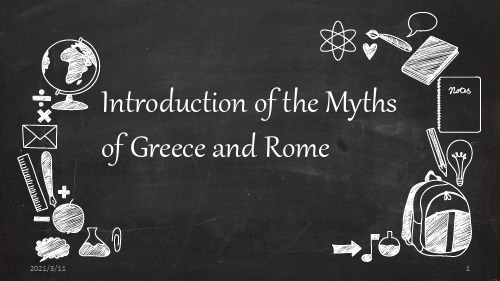
2021/3/11
12
03
Interrelationships
2021/3/11
13
The strength of Greek mythology lay in its collective nature . A myth always stood on its own , with a plot and a
2021/3/11
11
Roman myths
Gods of Mount Olympus, the most helpless, is small Cupid. Cupid has been as a symbol of love, he has a very beautiful golden hair, white and tender face, there could be free to fly wings. Cupid and his mother Venus are the head of love and marriage. Venus represents the rational love. On the contray, Cupid represents the crazy love. Cupid's images are blindfolded, it shows that, love is blind.
2021/3/11
9
Roman myths
Venus is the Roman god who is a symbol of love and
b2e02a1/3u/11ty, also a symbol of fertility goddess.
10
Roman myths
古希腊罗马神话——阿喀琉斯 ppt课件

维护这种荣誉和尊严就上升到第一位。当希腊主 帅阿伽门农声言要从阿喀琉
斯帐下抢走他心爱的女奴普特罗克洛斯时,阿喀琉斯感 到自己荣誉和尊严受到 了重创,他怒气冲冲地说:「我不想让人看不 起,留在这儿为你增加财富!」 阿伽门农淡然地回答说:「我要亲自 到你营帐里,把给你的奖赏、美丽的布里 塞伊斯(案:阿喀琉斯心爱 的女奴)带走,让你清楚地知道,我比你强多少, 也使其它人小心, 不要显得和我一样,当面给我顶撞。」阿喀琉斯气愤填膺, 如果不是 智慧女神阿西娜的制止,他将杀死自己的主帅。 从此,他既不出战, 也不参与议事,任凭自己的同胞成批 地死于特洛伊人的刀箭之下,
战 神 阿喀琉斯
ppt课件
1406 吴小龙
1
希腊神话即口头或文字上一切有关古希腊人的神、 英雄、自然和宇宙历史的神话。原始氏族社会的精 神产物,欧洲最早的文学形式。大约产生于公元前8 世纪以前,它在希腊原始初民长期口头相传的基础 上形成基本规模,后来在《荷马史诗》和赫西俄德 的《神谱》及古希腊的诗歌、戏剧、历史、哲学等 著作中记录下来,后人将它们整理成现在的古希腊 神话故事,分为神的故事和英雄传说两部分。
ppt课件
8
Arkey Works
英雄的爱情
如果说忘我战斗与温厚善良构成了阿喀琉斯性格中两个对立 的侧面的
话,支配这两个侧面的内核则是对于个人荣誉的理解与追求。 阿喀琉斯
不畏死亡走上战场,是因为他把勇敢视为最高荣誉,怯弱者 是「人间无价
值的赘物」。他热爱着自己的民族,但如果个人的荣誉 与尊严受到伤害时,
今天让我们来了解一下阿喀琉斯。
ppt课件
2
Arkey Works
阿喀琉斯
阿喀琉斯(Achilles)是荷马史诗《伊利亚特》 中的英雄,是希腊第一武士,他帮 助万王 之王阿迦 门侬(Agamemnon)攻破了坚固的特洛伊城 墙。 留下了木马屠城的传奇。 他精湛的武艺,英勇的气 概。和桀骜不 驯的气质为他带来了无尽的荣耀。他 的传 奇之死为历史留下了太多的谜团。
希腊罗马神话:5-6 帕尔修斯

珀耳修斯赶回塞里福斯时, 正赶上波吕得克忒斯正要强暴 其母。他马上取出墨杜萨的 头,将波吕得克忒斯化为石 头。珀耳修斯将王位赠给了善 良的鱼夫狄克提斯,和母亲回 到了希腊。然而,在一场竞技 大会上,他投掷的铁饼偶然将 外祖父击杀,最终印验了神 谕。珀耳修斯由于外祖父死于 自己之手,不愿继承其王位, 就去了亚洲。在那里他的儿子 波耳西斯成了波斯人的统治 者,波斯就是以他的名字命名 的。
珀耳修斯
Perseus
珀耳修斯 Perseus
是 希腊神话中最著名的英雄之一 ,宙斯与达那厄的儿子。达那 厄是国王阿克里西俄斯的女儿,神谕告诉阿克里西俄斯,他的外 孙有朝一日会杀死他。为防止此事发生,阿克里西俄斯就得设法 确保女儿无法生育。于是他将女 儿幽禁在一座铜塔里,让一位贪 婪的老婆婆寸步不离地看守着达 那厄,使任何男人也别想看见并 接近她。但是好色无度的大神宙 斯却不会受此拘束。他从空中看 见了达那厄并理所当然地爱上了 达那厄。他化着一阵金雨与达那 厄相会并使其受孕。
墨杜萨(Medusa)是三位一体面 目狰狞的女妖,头发是一窝纠 结的毒蛇,任何直接看到她可 怖面孔的生灵都会被化成冰凉 的石头。波吕得克忒斯想借此 机会除掉珀耳修斯,不料众神 在保佑他----宙斯的儿子。神使 赫尔墨斯指引他找到了格赖埃 ----三个丑陋的老太婆。这三个 丑恶的老太婆一共只有一只眼 睛和一颗牙齿,大家轮流使 用。珀耳修斯趁她们交换的时 候,夺走了她们的眼睛,为了 讨回眼睛,她们只好告诉他如 何找到墨杜萨。然后雅典娜借 给他一个盾牌,其光滑的表面 可用着镜子,使珀耳修斯不 必直视墨杜萨。
珀耳修斯、安德洛的创作题材,从古自今以他们为 题材的艺术作品数不胜数,美不 胜收,这些艺术品极大地丰富了 人类的精神宝库,为人类的审美 追求作出了巨大的贡献。
希腊罗马神话与西方文化源头第05讲:众女神
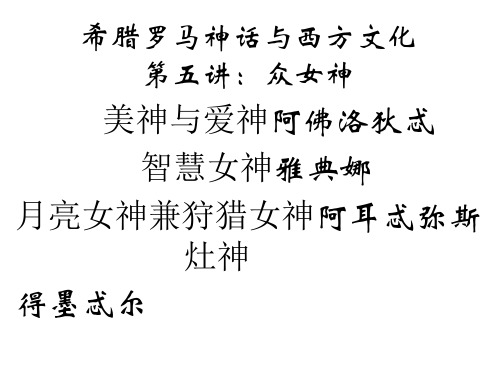
皮格马利翁
爱神节,他向爱神祈祷,爱神为 他的执着所感动,便赐予他的雕像生 命,让他最终拥有了一个美丽的妻子。
特洛伊战争期间,尽管阿佛洛狄 忒一再给予特洛伊人以帮助和保护, 也无法阻止特洛亚城的失陷和帕里斯 的死亡。
不过正因为有了她的保护,埃涅 阿斯才身背父亲、手携儿子、怀揣特 洛伊的护城神像,从熊熊燃烧的特洛 亚城逃出,去到意大利建立了自己的 新国家。
通过女神裸露的躯干和着衣的腿部之 间的比,形成一种秀美与丰满、单纯与 凝重的交响,具有“高度的单纯,静穆 的伟大”。在洁白的大理石内部, 似乎 蕴藏着少女的青春和生命的律动。
她像一座庄严的纪念碑,给人一种崇 高的感觉。然而,其亭亭玉立的姿态却 又优美动人。
尤其令人称奇的是,女神两臂虽失, 仍使人感到完好无损。罗丹赞为“古代 的神品”,因此对于“米洛的维纳斯”,
死前她向爱神阿佛洛狄忒 祈祷,希望她惩罚绝情无意的 那卡索斯,让他也品尝到单相 思的痛苦,且永远得不到所爱 的东西。
一天,那卡索斯在林中打 猎。那天天气炎热,他到附近 的湖边去饮水。湖水清澈晶 莹,平静如镜。
那卡索斯正待俯首饮水, 突然看到水中有个美男子,他 对这个水中幻影顿生爱慕之 情,于是就坐下来,目不转睛 地欣赏水中的倒影。
乌拉诺斯的身殖器被 克洛诺斯割下后丢到库忒 拉岛附近的海中,阿佛洛 狄忒就从海浪的白色浪花 中诞生。
阿佛洛狄忒是古希腊、
罗马神灵中的主角,她既 有典雅的姿色,又有奔放 的热情;既是爱的象征, 又是美的典范;既代表情 欲,又提倡节制。
她的诞生即是美与爱的 降临。
她身材高挑匀称,面庞 线条柔和,金发柔软卷 曲,就像戴着一顶花冠; 她是绝伦美色和青春永不 凋谢的体现。
、 自爱”。另外,英语里 daffodil意思是“黄水仙”
古希腊罗马神话故事.ppt

伊阿宋 (Jason) 拉奥孔 (Laocoon) 勒俄多科斯 (Leodocus) 林叩斯 (Lynceus) 墨勒阿革洛斯 (Meleagrus) 墨诺提俄斯 (Menoetius)
摩普索斯 (Mopsus) 瑙普利俄斯 (Nauplius) 俄琉斯 (Oileus) 俄耳甫斯 (Orpheus) 帕莱蒙 (Palaemon) 珀琉斯 (Peleus) 珀里克吕墨诺斯 (Periclymenus) 法勒洛斯 (Phalerus) 佛利阿斯 (Phlias) 波吕丢刻斯 (Polydeuces) 波吕斐摩斯 (Polyphemus) 塔拉俄斯 (Talaus) 忒拉蒙 (Telamon) 提费斯 (Tiphys) 仄忒斯 (Zetes)
阿耳戈斯 (Argus) 阿利俄斯 (Arius) 阿斯忒里翁 (Asterion) 阿斯忒里俄斯 (Asterius) 奥革阿斯 (Augeas) 波忒斯 (Butes) 卡拉伊斯 (Calais) 卡尼托斯 (Canthus) 卡斯托耳 (Castor) 刻甫斯 (Cepheus) 克吕提俄斯 (Clytius) 科罗诺斯 (Coronus) 厄喀翁 (Echion)
厄耳癸诺斯 (Erginus) 厄里玻忒斯 (Eribotes) 欧斐摩斯 (Euphemus) 欧律达玛斯 (Eurydamas) 欧律提翁 (Eurytion) 欧律托斯 (Eurytus) 赫拉克勒斯 (Heracles) 许拉斯 (Hylas) 伊达斯 (Idas) 伊德蒙 (Idmon) 伊克力斯 (Iphiclus) 伊克力斯(另一位)
许珀茜伯勒(Hypsipyle)
希腊罗马神话教程-Unit 5 Major Olympian Deities (II)
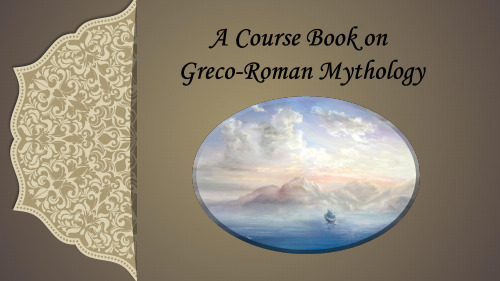
PART TWO
Birth of Aphrodite
Aphrodite, the foam-born goddess
aphros=sea-foam
Lady of Cyprus
Birth of Aphrodite
Two Versions of Birth:
• Old: no mother, from the severed genitals and semen of Uranus, the primal sky god
• New: the daughter of Zeus and Dione, a Titaness
Readings of Her Birth ( Old Version)
Comment
• the struggle between the two sexes for power • the double standard of sexuality • the tendency to pick among the weaker as object of revenge:
Readings of Her Birth ( Old Version)
3. Aphrodite as a product of male sexual as well as sensual pleasure (from the way of her birth):
semen (seeds) + sea foam (life source) = Aphrodite = sex/beauty/pleasure
[born as a product of Man engaged in sexual activity, or produced by Man at moment of sexual pleasure]
古希腊罗马神话赏析论文

古希腊罗马神话赏析论文院系:电气信息工程学院专业:电气工程及其自动化班级:学号:姓名:论奥德修斯人物形象特征希腊神话中有个名叫奥德修斯的战将,用木马计大破特洛伊,一剑刺瞎独目巨人波吕斐摩斯。
他的神勇,引来众女神妖的倾慕。
他战胜魔女基尔克,挡住海妖塞壬美妙歌声的诱惑,摆脱神女卡吕普索的追求,历经磨难,最终回到了自己的皇宫。
那他究竟是个什么性格特征的英雄呢?《伊利亚特》中描述了一个善用言辞、计谋、夜袭、埋伏的奥德修斯。
奥德修斯刚一亮相, 荷马特别强调他外表不起眼, 但是在他从胸中发出宏亮的声音时, 他的言词却像冬日的雪花纷纷落飘下, 没有凡人能同奥德修斯相比。
如此推崇奥德修斯的言辞, 乃因为言辞与智慧相关。
到了《奥德赛》奥德修斯直接凭借智慧和言辞(主要是谎言)完成了另一类型英雄的塑造。
面对战后的新世界, 奥德修斯并不以勇力取胜。
与《伊利亚特》的尚武相比, 《奥德赛》更重智。
奥德修斯的追寻——《奥德赛》的环境比《伊利亚特》复杂得多, 同样是十年的时间, 《伊利亚特》发生的事件定格在特洛亚, 而《奥德赛》里奥德修斯跑遍地中海四处漫游。
《伊利亚特》里的英雄只需在战场格杀, 赢取战斗的胜利; 奥德修斯在战争结束后却面对复杂的人和事, 其处境和际遇几乎涵盖了古代社会的所有模式: 独目巨人波吕斐摩斯的野蛮粗暴, 有教养且愿意送客返乡的费埃克斯人; 助人为乐的友好主人(如赐奥德修斯风袋的风王艾奥洛斯), 吃人的生番巨人族莱斯特律戈涅斯人; 让人遗忘过去的洛托法戈伊人, 歌声迷人却异常危险的女妖塞壬; 善用药草的魔力把人变成猪猡的魔女基尔克, 清纯可爱的少女瑙西卡亚和亲切感性的神女卡吕普索, 等等。
经过这些经历的磨砺, 奥德修斯成为一个阅历丰富, 理解一切事物的人。
荷马让奥德修斯的旅程和返乡成为人生战场, 其残酷激烈丝毫不亚于血肉搏杀的真实战场, 其诡谲奇幻又非真实战场可比。
和奥德修斯同住了七年的神女卡吕普索曾经问他, 为什么不要神女的眷爱和长生不死, 这些不就是凡人追逐的东西吗? 奥德修斯答曰, 他怀念故土, 渴望返回家园对奥德修斯的话不能只作字面的理解。
罗马神话故事5篇精选荟萃集锦

罗马神话故事5篇精选荟萃集锦罗马⼀直是与它的起源和传说中的神有关的神秘故事的主题,罗马⼈⼀直相信超⾃然的元素,这些元素反映在他们的信仰中。
下⾯给⼤家带来⼀些关于罗马神话故事5篇精选荟萃集锦,供⼤家参考。
罗马神话故事5篇精选荟萃集锦1⽪拉和丢卡利翁在青铜⼈类的世纪,世界的统治者宙斯听到住在世界上的⼈类所做的坏事,他决定变形为⼈降临到⼈间查看。
但⽆论他到什么地⽅,他发现事实⽐传闻要严重得多。
⼀晚,快到深夜的时候,他来到并不喜欢客⼈的阿⽿卡狄亚国王吕卡翁的⼤客厅⾥。
他是以粗野著名的⼈。
宙斯以神异的先兆和表征证明了⾃⼰的神圣的来历,⼈们都跪下向他膜拜。
但吕卡翁嘲笑他们虔诚的祈祷。
“让我们看罢,”他说,“究竟我们的这个客⼈是⼀位神祇还是⼀个凡⼈!”于是他暗⾃决定在半夜中当他熟睡的时候将他杀害。
最初他杀死摩罗西亚⼈所送给他的⼀个可怜的⼈质,把⼀部分还温热的⾁体扔在滚⽔⾥,⼀部分烧烤在⽕上,并以此为晚餐献给客⼈。
宙斯看出他所做的和想要做的,从餐桌上跳起来,投掷复仇的⽕焰于这不义的国王的宫殿。
吕卡翁战栗着逃到宫外去。
但他的第⼀声绝望的呼喊就变成了嗥叫。
他的⽪肤成为粗糙多⽑的⽪,他的⼿臂变成前腿。
他被变成了⼀只喝⾎的狼。
其后宙斯回到俄林波斯圣⼭,坐着和诸神商议,决定除灭全部可耻的⼈类种族。
他正想⽤闪电鞭挞整个⼤地,却⼜即时住⼿,因为恐怕天国会被殃及,并烧毁宇宙的枢轴。
所以他放下库克罗普斯为他所炼铸的雷电,决⼼以暴⾬降落地上,⽤洪⽔淹没⼈类。
即刻,北风和别的⼀切可使天空明净的风都锁闭在埃俄罗斯的岩洞⾥,只有南风被放出来。
于是南风隐藏在漆⿊的⿊夜⾥,扇动湿淋淋的翅膀飞到地上。
涛浪流⾃他的⽩发,雾霭遮盖着他的前额,⼤⽔从他的胸脯涌出。
他升到天上,将浓云捞到他的⼤⼿⾥,然后把它们挤出来。
雷霆轰击,⼤⾬从天⽽降。
⼤风⾬的狂暴蹂躏了庄稼,粉碎了农民的希望。
⼀年长期的⾟苦都⽩费了。
宙斯的兄弟,海神波塞冬也帮助着这破坏的盛举。
他把河川都召集来说道:“泛滥你们的洪流!吞没房舍和冲破堤坝吧!”他们都听从他的命令。
《希腊罗马神话》PPT课件

希腊罗马神话
神话的定义 英文中的神话<myth>一词来自希腊语中的
"mythos",其含意是"表达"、"言说"、"故事" 或"传说"等 . Mythology有两层意思,一个是指神话的总称或 神话集 ,神话故事通常不是分散、单个故事的 讲述,而往往是汇聚成体系,由若干有内在联系 的故事构成属于某特定民族的叙事,讲述其起 源、神祗、先祖和先祖崇拜的英雄人物,一般 涉及历史纪元开始之前"混沌之初"的时期.另 一层含意是神话学,指的是对神话叙事进行系 统收集和研究的学术领域 .
阿佛洛狄忒<Aphrodite>——美神与爱神 ;阿 瑞斯<Ares>——战神 ;赫菲斯托斯 <Hephaestus>——火神及工匠之神 ;赫尔墨 斯<Hermes>——诸神的传令使;德墨忒尔 <Demeter>——农耕和丰收女神 ;狄俄尼索 斯<Dionysus>——酒神.
希腊神话故事之一二
希腊神话中神的谱系
希腊神话包由神的故事和英雄传说两大类组成.
主神有: 宙斯<Zeus>——众神之君,掌管天上和人间 ; 赫拉<Hera>——天后,宙斯之妻,婚姻及妇女的保护神; 波塞冬<Poseidon>——海洋之神 ;哈得斯 <Hades>——冥王,主管冥间、地府;雅典娜 <Athena>——智慧女神 ;阿波罗<Apollo>——光明 之神;阿尔忒弥斯<Artemis>——狩猎与月亮女神;
在世界各神话体系当中 ,有产生于斯堪的纳维亚的北 欧神话和产生于中东的古代希伯莱神话 ,最广为人知 的就是古希腊神话、古罗马神话 .
古希腊罗马神话第五讲
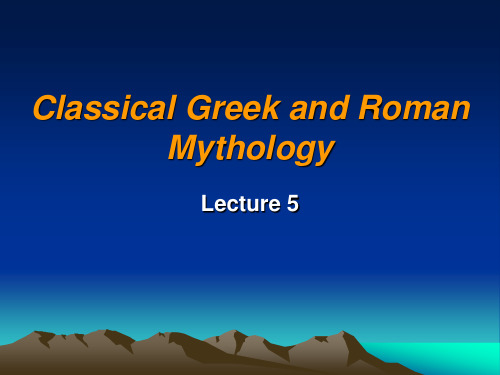
Perseus turned Atlas into mountains
• In due course he came in sight of the giant Atlas, to whom the gods had appointed the task of supporting the sky on his shoulders. • Perseus had taken off his magic helmet, so Atlas saw him afar off, and was glad. • "But oh, great Perseus, if ever you felt pity for grief, take pity on me now, who am condemned to support the sky for all eternity, unless you will bring an end to my sufferings! Show me the face of Medusa, and let me be changed into stone!" • And a moment only -- then Atlas' smile froze, and the giant's great bulk, slowly solidifying, was transformed to rough and craggy stone and then an immense mountain appeared with its top lost in the rolling clouds. • atlas: 地图集,航图集;支撑柱;肌肉发达的男子
希腊罗马神话5-Zeus and Hera
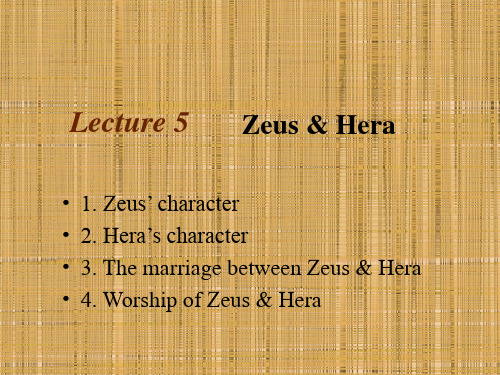
Children
• She had several offspring with Zeus including: Ares (the god of war), Eleithyria [ il i θ i ] (goddess of childbirth), Eris (the goddess of discord, 纷争女神), Hebe(赫柏) , Hephaestus(赫淮斯托斯).
• Hera is often very jealous about Zeus’ lovers and takes revenge on those rivals in love or their offspring, such as her hatred of Heracles
• e.g. she sent snakes to kill him as a baby but he strangled (扼死) them.
• The personification of the laws of nature • The lord of state-life • The father of gods and men
Zeus, Dion (at foot of Mt. Olympus)
2. Hera’s character
the Olympians from war. Thetis summoned
Briareus[
](布里
阿柔斯), one of the 3 Hundred-handers.
Using all of his hands at once, Briareus
